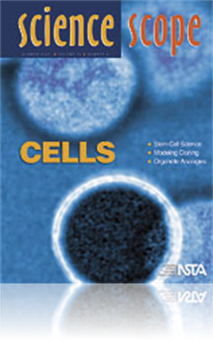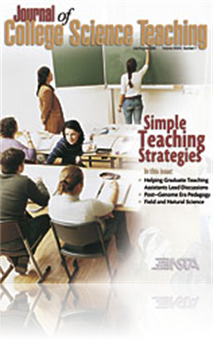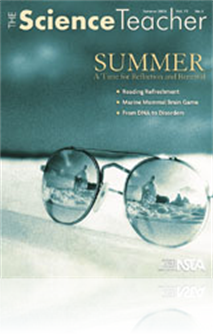All Resources
Journal Article
Turn your classroom into a candy factory to help students gain an understanding of cell organelles in a meaningful context. Students compare the cell’s structures and functions to something that all students can relate to—food!...
Journal Article
Enhancing the Instructional Environment: Optimal Learning in Introductory Science Classes
A survey of 55 colleges showed that the learning environments in introductory science courses are not always as supportive as they should be. Furthermore, most innovative teaching techniques, as recommended by the National Science Education Standards...
Journal Article
Teaching Through Trade Books: Seasons by the Sun
Understanding the Sun has challenged people since ancient times. Mythology from the Greek, Inuit, and Inca cultures attempted to explain the daily appearance and nightly disappearance of the sun by relating it to a chariot racing across the sky. Wh...
Journal Article
The fact that one little letter out of three billion can really make a difference in the genetic makeup of an individual is often difficult for high school students to grasp. Molecular biology is a challenging topic to teach because students struggle...
Journal Article
Embracing Controversy in the Classroom
Controversial topics such as stem-cell research can help build scientific understanding, enhance communication skills, and develop an appreciation for civic decision making. This five-tiered approach allows students to delve into the gray areas that ...
Journal Article
Idea Bank: Forensics on a Shoestring Budget
In recent years, forensic science has gained popularity thanks in part to high-profile court cases and television programs. Although the cost of forensic equipment and supplies may initially seem too expensive for the typical high school classroom, t...
Journal Article
Science Sampler: Cancer -- Mitosis run amok
Studying cancer can provide a real-life understanding of the normal cell cycle and what happens when it goes awry. In this activity, students research a type of cancer and create a brochure that could help someone who has just been diagnosed with a p...
Journal Article
Science 101: Do other planets have summer?
This articles tackles the question of whether other planets have a summer, what it consists of and how their summers relate and differ from our own on Earth....
Journal Article
Teaching allows us to be lifelong learners and the summer months provide the window of opportunity to catch up, reflect, and refresh. Did you realize that one of your best professional development options may just be a beach chair and a good book? Th...
Journal Article
Are you looking for ways to log professional development hours without traveling too far away from home this summer? Through reading, a teacher can spend valuable hours updating content background and methods, or simply refreshing the spirit --at you...
Journal Article
Sixth-grade students learn about the scientific processes of archaeology and paleontology when they participate in this activity. Students participate in integrated lessons based on the two disciplines, with language arts, social studies, and mathema...
Journal Article
Ask the Experts -- Summer 2005
The questions presented in this month's Ask the Experts section include, Can a chemical equation have two correct ways to balance it? and Why is the first electron shell in atomic structure designated with "K" (K, L, M, N...) rather than "A"?...
Journal Article
Tried and True: Presenting mitosis
Bring the stages of mitosis to life for your students with the use of technology. In this engaging lesson, students are introduced to the topic of cell division, and then students can showcase their interpretations of the stages of mitosis by creatin...
Journal Article
Editor's Corner: Reflection and Renewal
According to Field Editor, Steve Metz, science teachers know that the traditional time for reflection on the past year is more likely to come in July than in January. Since summer is the time for reflecting on past practices and planning in anticipat...
Journal Article
Science teachers don't always have to write their own case studies; after all, there are plenty of books that feature science in their plots. This case study uses the book State of Fear as the basis for a discussion of global warming issues....






